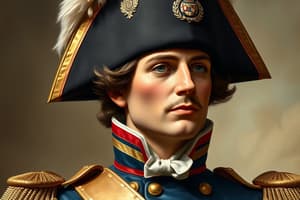Podcast
Questions and Answers
What significant political change occurred in France after the French Revolution?
What significant political change occurred in France after the French Revolution?
The monarchy was abolished, and the Directory was established.
Who was the military leader instrumental for the French army during the Revolution?
Who was the military leader instrumental for the French army during the Revolution?
Napoleon Bonaparte was the military genius of the French army.
How did Napoleon come to power after the Directory?
How did Napoleon come to power after the Directory?
He overthrew the Directory in 1799 and established the Consulate.
What was the outcome of the Battle of Trafalgar for Napoleon?
What was the outcome of the Battle of Trafalgar for Napoleon?
What was the Confederation of the Rhine and its significance?
What was the Confederation of the Rhine and its significance?
What were the Peninsular Wars and their impact on Napoleon?
What were the Peninsular Wars and their impact on Napoleon?
What was Napoleon's fate during his invasion of Russia?
What was Napoleon's fate during his invasion of Russia?
What was the Continental Blockade and its purpose?
What was the Continental Blockade and its purpose?
What strategy did Russian troops employ during Napoleon's advance, and what was its impact on his army?
What strategy did Russian troops employ during Napoleon's advance, and what was its impact on his army?
What was the outcome of Napoleon's campaign in Russia and what factors contributed to this result?
What was the outcome of Napoleon's campaign in Russia and what factors contributed to this result?
What coalition defeated Napoleon after his return from Elba, and what was the significant battle that marked this defeat?
What coalition defeated Napoleon after his return from Elba, and what was the significant battle that marked this defeat?
What was the long-term impact of the Code Napoleon on Europe?
What was the long-term impact of the Code Napoleon on Europe?
How did Napoleon's treatment of the pope affect his popularity among the French Catholics?
How did Napoleon's treatment of the pope affect his popularity among the French Catholics?
What were the economic implications of Napoleon's rule on feudalism in France?
What were the economic implications of Napoleon's rule on feudalism in France?
What was the significance of Napoleon's vision of a 'United States of Europe'?
What was the significance of Napoleon's vision of a 'United States of Europe'?
In what ways did the failures of the Russian campaign weaken Napoleon's reputation in Europe?
In what ways did the failures of the Russian campaign weaken Napoleon's reputation in Europe?
What role did the new national forces play in the opposition against Napoleon?
What role did the new national forces play in the opposition against Napoleon?
What was one of the main reasons for the coalition's formation that led to Napoleon's defeat?
What was one of the main reasons for the coalition's formation that led to Napoleon's defeat?
Flashcards are hidden until you start studying
Study Notes
The Rise of Napoleon Bonaparte
- Following the French Revolution, the monarchy was abolished, and the Directory was established, prompting alarm among European monarchies.
- Napoleon Bonaparte emerged as a military leader, known for his exceptional generalship during the Revolution.
- In 1799, Napoleon overthrew the Directory and founded the Consulate, becoming the first consul among three to lead France.
- He initiated military campaigns against various European coalitions opposing France's expansion.
- By 1804, Napoleon crowned himself emperor at the Cathedral of Notre Dame, establishing the First French Empire.
Napoleon's Wars and Key Battles
- Between 1801 and 1812, Napoleon expanded French control over most of Europe before losing most territories by 1815.
- The Battle of Trafalgar (1805) resulted in a significant defeat for Napoleon against Admiral Nelson's British fleet.
- In response to British maritime dominance, he implemented the Continental Blockade (1806) to disrupt trade with Britain.
Confederation of the Rhine
- Napoleon's victory at the Battle of Austerlitz (1806) led to the formation of the Confederation of the Rhine, comprising 16 German states, later expanded to 35.
- Austria and Prussia opted out of this Confederation, established to unify German states and centralize administration akin to Napoleon's empire.
The Peninsular Wars
- Napoleon invaded Spain and Portugal (1807-1814) due to their non-compliance with the Continental Blockade, a campaign that drained resources and manpower.
- This prolonged conflict is referred to as Napoleon's "Spanish Ulcer."
The Russian Campaign
- Napoleon's invasion of Russia in 1812 with a large army faced strategic withdrawal by Russian forces, destroying resources and villages.
- The harsh winter and logistical failures forced a disastrous retreat, resulting in massive casualties and significantly weakening his army.
The Battle of Waterloo and Downfall
- A coalition of England, Prussia, Russia, and Austria defeated Napoleon, leading to his exile to Elba.
- After a brief return to power known as the Hundred Days, he was decisively defeated at the Battle of Waterloo (June 1815) by the Duke of Wellington.
- Napoleon was subsequently exiled to Saint Helena, where he died in 1821.
Causes of Napoleon’s Downfall
- Military campaigns stoked discontent and resentment across Europe, leading to costly losses in human lives and treasure for France.
- His harsh treatment of the pope alienated Catholic support, and dispossessed monarchs resented his ascendancy.
- Nationalist sentiments that arose post-monarchy were overlooked in Napoleon's political arrangements.
- The failed Russian campaign greatly diminished his army and reputation, weakening his grip on Europe.
Impact of Napoleon's Rule
- Napoleon’s ambition for a unified European Empire was inspired by historical figures like Alexander the Great.
- He instituted the Code Napoleon in 1804, establishing legal reforms based on liberty, equality, and fraternity across conquered territories.
- This legal code facilitated a unified administration and became a foundation for modern European legal systems.
- Together with the French Revolution, Napoleon's rule ended feudalism in France, redistributing land from the Church and nobility, and paving the way for capitalism.
Studying That Suits You
Use AI to generate personalized quizzes and flashcards to suit your learning preferences.




